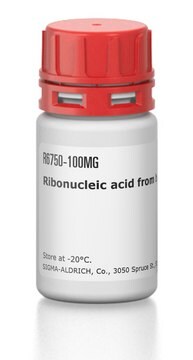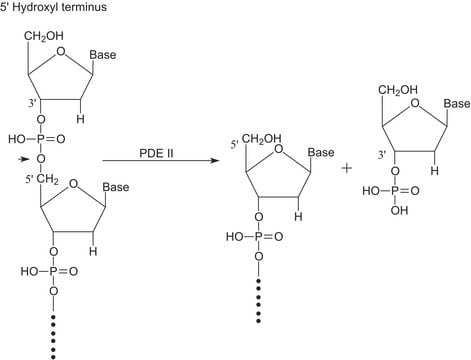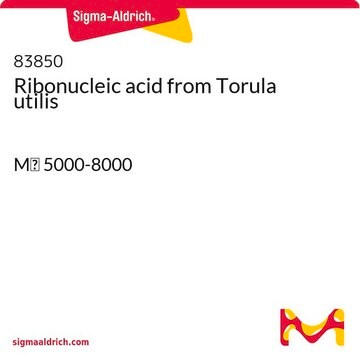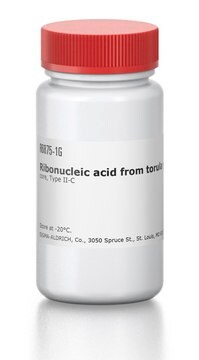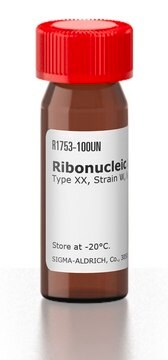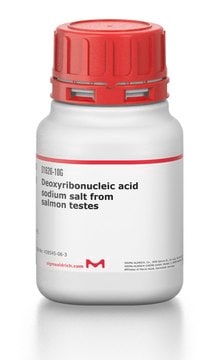추천 제품
일반 설명
Ribonucleic Acid (RNA) from torula yeast is the substrate for the RNase enzyme. The isolation of RNA from yeast is a complicated process and involves heating and freezing cycles of cells in the presence of phenyl and detergents (SDS).
애플리케이션
Ribonucleic Acid (RNA) is suitable for applications such as northern blot hybridization, reverse transcriptase-polymerase chain reaction (RTPCR), and cDNA construction.
Ribonucleic acid (RNA) from torula yeast may be used as a substrate for studying ribonuclease activities of enzymes such as ribonuclease-A, ribonuclease T1 (RNAase), and bougainvillea xbuttiana antiviral protein 1 (BBAP1)
Ribonucleic acid (RNA) from torula yeast may be used as a substrate for studying ribonuclease activities of enzymes such as ribonuclease-A, ribonuclease T1 (RNAase), and bougainvillea xbuttiana antiviral protein 1 (BBAP1)
품질
Phosphorus: 8.0-10.0% (anhydrous)
Storage Class Code
11 - Combustible Solids
WGK
WGK 3
Flash Point (°F)
Not applicable
Flash Point (°C)
Not applicable
개인 보호 장비
Eyeshields, Gloves, type N95 (US)
가장 최신 버전 중 하나를 선택하세요:
시험 성적서(COA)
Lot/Batch Number
Jay S Petrick et al.
Regulatory toxicology and pharmacology : RTP, 81, 57-68 (2016-10-30)
Genetically modified (GM) crops have been developed and commercialized that utilize double stranded RNAs (dsRNA) to suppress a target gene(s), producing virus resistance, nutritional and quality traits. MON 87411 is a GM maize variety that leverages dsRNAs to selectively control
Michael R Green et al.
Cold Spring Harbor protocols, 2021(12) (2021-12-03)
Isolation of RNA from yeast is complicated by the need to first break the thick, rigid cell wall. The protocol provided here uses a cycle of heating and freezing of cells in the presence of phenol and the detergent sodium
Stephanie L Grillo et al.
Purinergic signalling, 15(3), 327-342 (2019-07-06)
Adenosine is an endogenous nucleoside in the central nervous system that acts on adenosine receptors. These are G protein-coupled receptors that have four known subtypes: A1, A2A, A2B, and A3 receptors. In the present study, we aimed to map the
Shahab M Danesh et al.
Gene expression patterns : GEP, 9(5), 255-265 (2009-04-28)
Cell-cell communication is critical for regulating embryonic organ growth and differentiation. The Bone Morphogenetic Protein (BMP) family of transforming growth factor beta (TGFbeta) molecules represents one class of such cell-cell signaling molecules that regulate the morphogenesis of several organs. Due
Jesus E Martinez-Lopez et al.
Frontiers in neuroanatomy, 9, 12-12 (2015-03-06)
In the study of central nervous system morphogenesis, the identification of new molecular markers allows us to identify domains along the antero-posterior and dorso-ventral (DV) axes. In the past years, the alar and basal plates of the midbrain have been
자사의 과학자팀은 생명 과학, 재료 과학, 화학 합성, 크로마토그래피, 분석 및 기타 많은 영역을 포함한 모든 과학 분야에 경험이 있습니다..
고객지원팀으로 연락바랍니다.
